Xinwei Che Invites Her Audience to Inhabit Time with ‘Mend Walks’ and ‘Laying Ground’
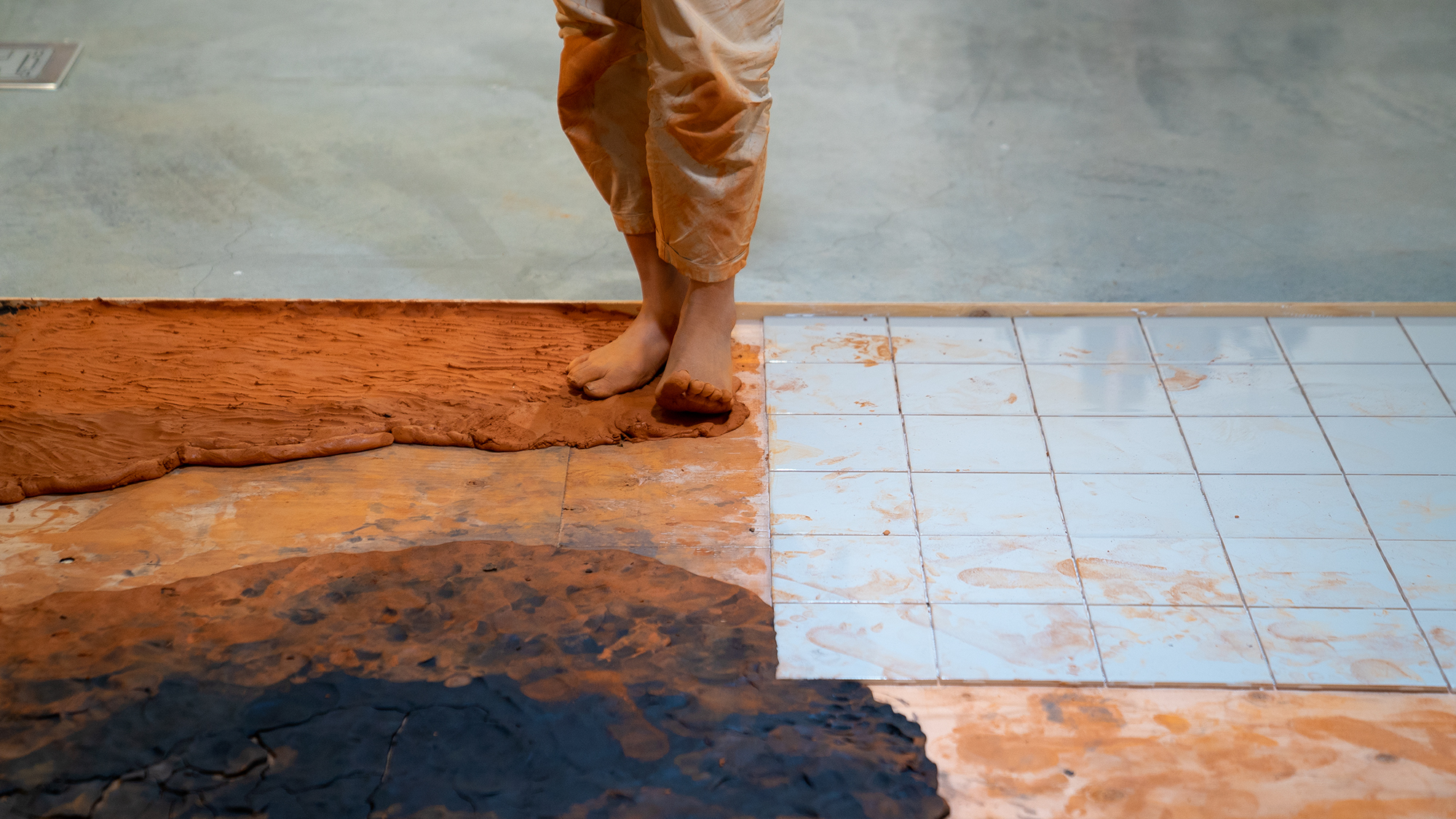
From Xinwei Che's Laying Ground. (Photo by Gemma Crowe / courtesy Xinwei Che)
Posted on | Updated
The artist and graduating ECU MFA student’s exploration of themes including futility and care are documented in her film, debuting April 11 as part of the MFA Thesis Exhibition.
“I felt an urgent desire to be in time more expansively,” Xinwei Che, artist and graduating MFA student (MFA 2022) tells me via video chat. She’s describing her reaction to the persistent hurriedness that defines the lives of her friends, family and peers, as well as her own life.
Over the past several years, Xinwei has explored this desire — to “slip from the pacing of capitalist time, and be in time more fully” — in a series of performance works. These include the 40-hour performance titled Holding; the 40-hour performance titled Maintenance in Progress; and her recent series of collaborative performances titled Mend Walks.
By proposing the present tense as a site of resistance to time pressure, Xinwei’s performances aim to hold space for a different experience of time.
“I wanted to create temporal spaces in which people might become more attuned to geological time scales through the rhythms of clay and water. I know it's a challenge – these time scales exist in friction to the efficiency-driven pacing of everyday time,” she says. For instance, many viewers find it difficult to observe her multi-day performances for prolonged periods of time.
“But that’s precisely why I care so much about this work. People constantly live with time pressure, and their field of stimulus is so broad — there’s so much information. They have text messages on their phone. They’re having conversations with a colleague. Somebody else is ordering lunch. What about the coffee I need to grab for my next meeting? Through embodied material movements, I want to open up the possibility of slipping from this relentless pacing.”
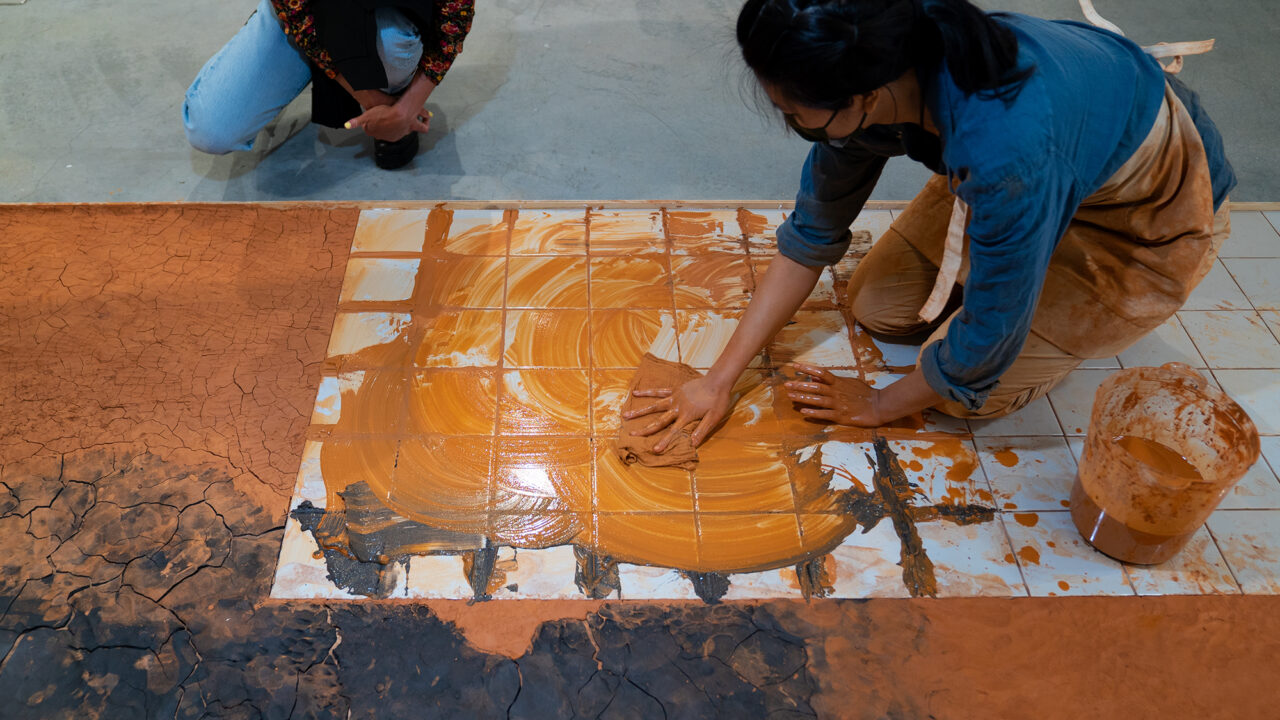
From Xinwei Che's Laying Ground. (Photo by Gemma Crowe / courtesy Xinwei Che)
In a new film, titled Laying Ground, Xinwei aims to address that challenge. Close framing of Xinwei’s interactions with clay and water emphasize the slower “material time scales” associated with drying clay. Meanwhile, ambient sounds from the busy concourse around her performance remain audible. This tension points directly to the “multiplicity of temporal rhythms at the site,” Xinwei writes.
Most of the busy activity we hear remains outside the frame, she notes. Meanwhile, the camera remains trained on “the cracks weaving through the clay ground, drawing closer to reveal minute shifts in colour and texture as clay dries gradually over time.”
In her recent Mend Walks series, Xinwei brought the audience inside the performance itself. Xinwei invited individuals to join her in applying unfired clay — coloured red by its iron-oxide content — to cracks in the pavement around ECU’s campus grounds.
Participants were given a simple introduction before the walk. Xinwei invited them to “consider cracks not as a structural flaw, but as a necessary release of tension trapped within or beneath the surface. A rupture that allows new possibilities to arise.” Thereafter, these collaborative, hour-long exercises were conducted in silence, “so the experience is between us and the material.”
Previously, viewers were often curious about Xinwei’s experience of time, or about the purpose of her performance. Xinwei admits a reluctance to answering these questions.
“I cannot articulate what is still forming for me during these experiences of time,” she says. “When we circumscribe something in language, we stop observing actively."
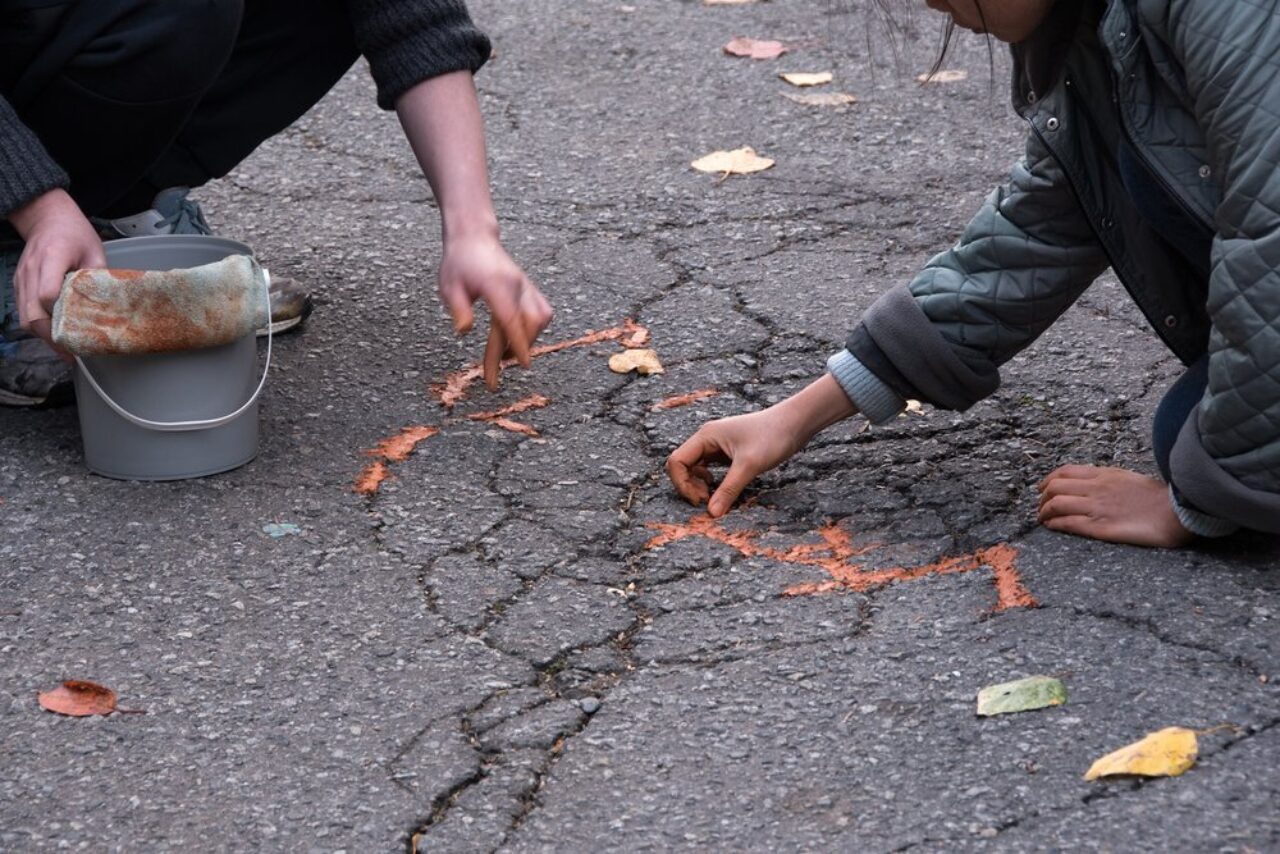
From Xinwei Che's Mend Walks. (Photo by Laura Herridge / courtesy Xinwei Che)
During Mend Walks, Xinwei’s audience engaged with her work in entirely new ways. During one particular walk, Xinwei and her guest encountered “many pavement cracks teeming with plant life,” she recalls. By unspoken agreement, they filled the cracks only where plants were not visibly growing.
“After the walk, my guest confessed she was worried whether our ‘mending’ the cracks was in fact smothering hidden plants and depriving them of sunlight,” she says. “This response precisely expresses the complexity I’m interested in introducing to my work, which is often read through a lens of care. As Shannon Mattern writes, ‘We should also remember that the preservation of our world – the human one – is sometimes at odds with caring for the ecological context. Perhaps not every road should be repaired.’”
This anecdote also suggests another of the central themes of Xinwei’s practice: the difference between work that is futile and work that fulfils a purpose is only one of perspective.
“I am interested in those moments when somebody thinks my work is futile,” she tells me. “Because I wonder how do we measure the value of an activity?”
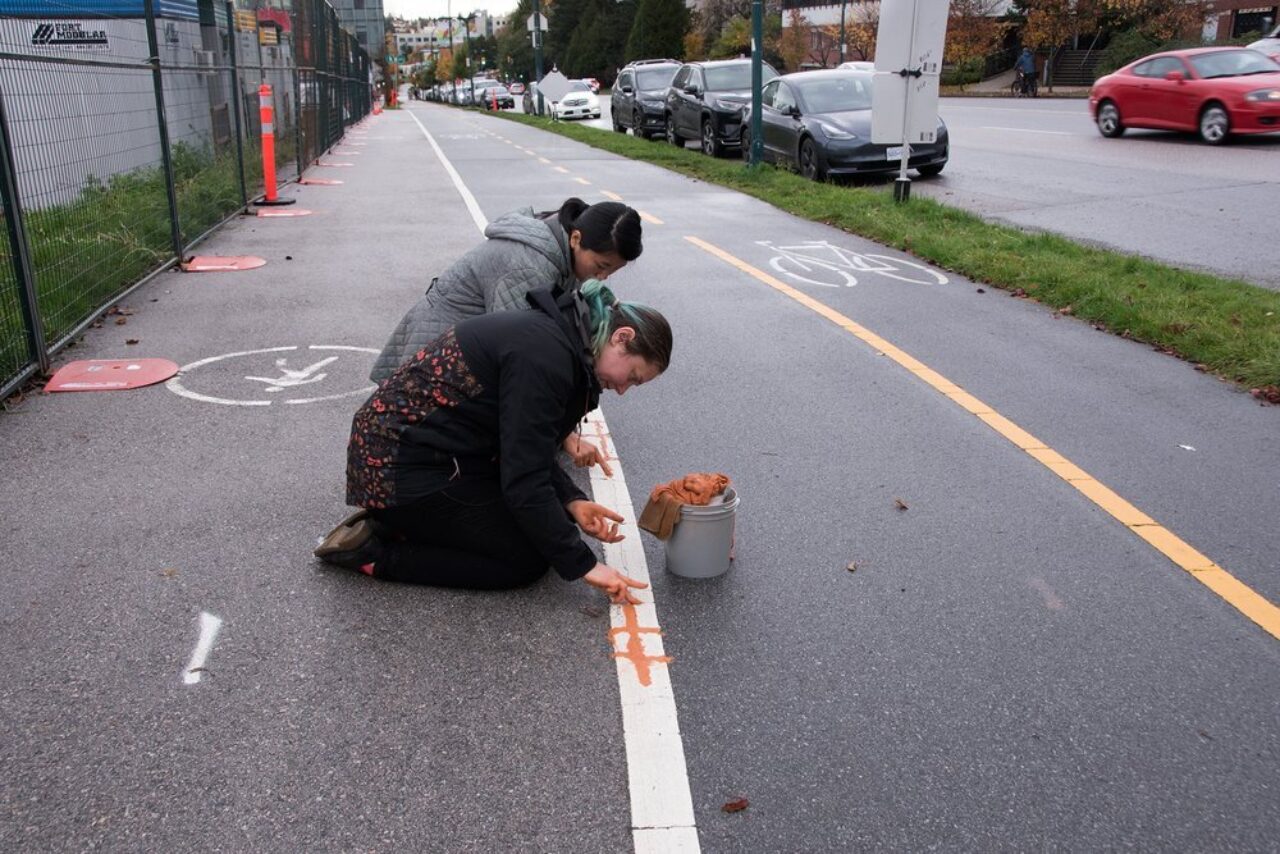
From Xinwei Che's Mend Walks. (Photo by Laura Herridge / courtesy Xinwei Che)
For instance, with Mend Walks, the unfired clay Xinwei uses is washed away by Vancouver’s frequent rains.
“But these minerals are simply returning to the geological cycle they came from,” Xinwei says.
“Through this process, I practice accepting that my material gestures are ephemeral, and that I am only here for a short time – and herein lies its value.”
When we ask ourselves these same questions, we confront a fundamental assumption. Namely, that any activity not aimed explicitly at measurable “productivity” is a waste of time.
“It’s kind of ironic because time is the most valuable thing we have as mortal beings,” she continues. “We are only here for a little while. But in being so rushed for time, we never truly get to experience our life in all its expansiveness and richness.”
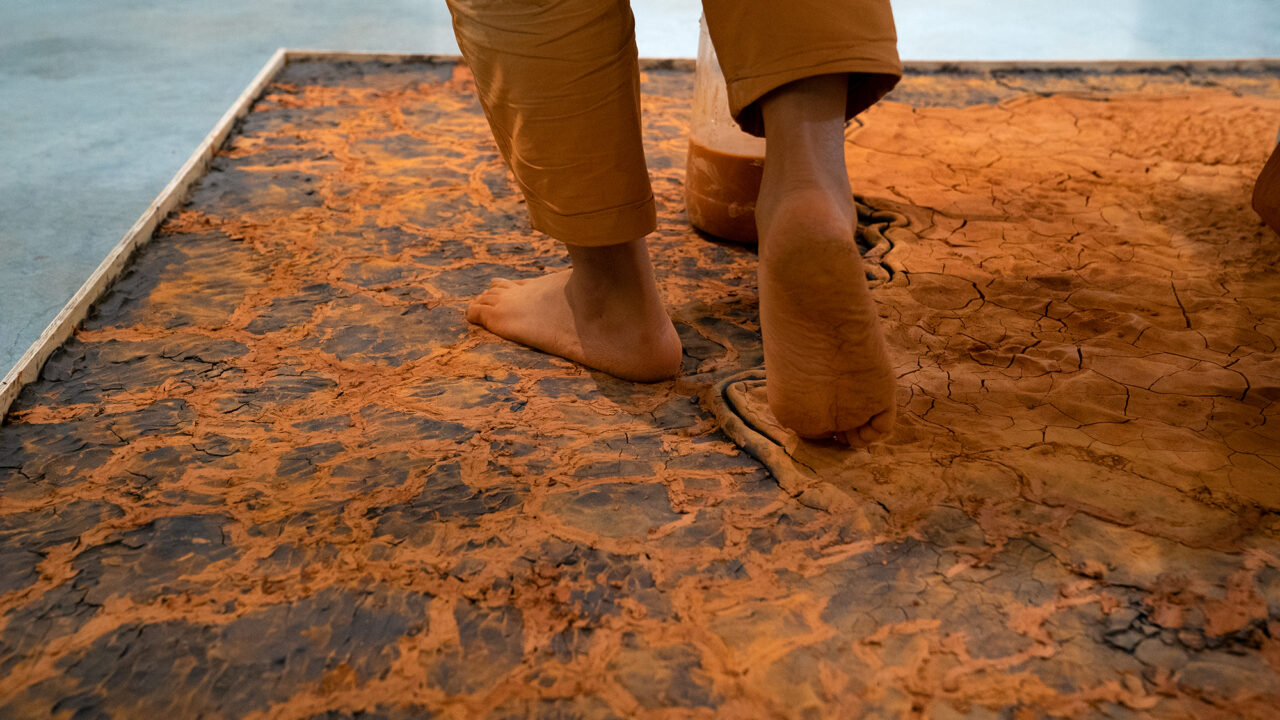
From Xinwei Che's Laying Ground. (Photo by Gemma Crowe / courtesy Xinwei Che)
Xinwei’s new film, titled Laying Ground, will show as part of the MFA Thesis Show at ECU, opening April 11. Laying Ground will screen twice daily on April 11, 13, 16 and 19 in the Multipurpose Screening at Emily Carr University, Room D1375. Due to limited seating, audience members are kindly requested to RSVP online prior to attending.
Visit Xinwei’s website and follow her on Instagram to see more of her work.